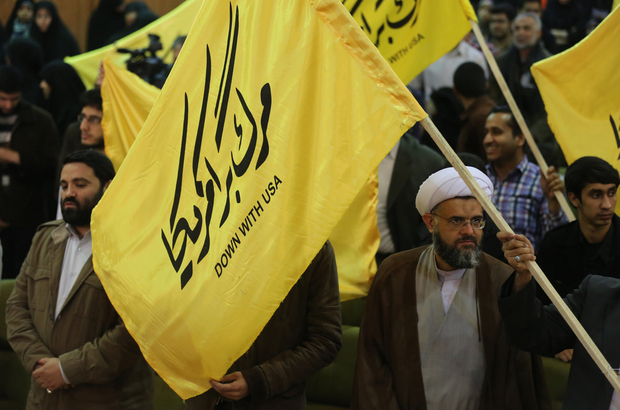Nasser Karimi and Jon Gambrell, associated press

Iranian state television on Tuesday claimed that a Washington-based Lebanese citizen missing in Tehran since September is actually an American spy now in the custody of authorities.
However, those who know Nizar Zakka — who holds permanent-resident status in the United States — said an image of him in army-style fatigues shown on Iranian state TV came from him recently taking part in a homecoming parade as an alumnus of his military high school in Georgia.
The state TV report is the first official word in Iran about Zakka since his disappearance. It comes as four Americans are known to be held by Iranian authorities after the Islamic Republic struck a nuclear deal with world powers.
Jim Benson, the president of Riverside Military Academy in Gainesville, said state TV even identified the wrong man in the image as Zakka.
"He’s a good and decent man. There’s nothing subversive about him," Benson told The Associated Press. "We’re terribly worried about him and concerned about how his family is taking all of this."
Zakka disappeared Sept. 18 while visiting Tehran for a state-sponsored conference, according to a statement from the Washington-based group IJMA3-USA, which advocates for Internet freedom across the Middle East. Zakka was last seen leaving his hotel in a taxi for the airport to fly to Beirut, but he never boarded his flight, according to a statement last week signed by Lebanese lawyer Antoine Abou Dib.
Reached Tuesday by The Associated Press, Abou Dib said he had not heard of the Iranian claim and declined to immediately comment. IJMA3-USA did not immediately return a request for comment.
In Washington, U.S. State Department spokeswoman Elizabeth Trudeau said officials were aware of Zakka’s case. However, "U.S. lawful permanent residents are not U.S. passport holders and would travel on the passport of their nationality," she said. "Consular assistance would be provided by the country of the individual’s nationality."
Lebanese officials couldn’t be immediately reached for comment.
The state TV report claimed Zakka had "deep links" with U.S. intelligence services and its military. It also aired a still photo of four men in U.S. Army-style uniforms, two carrying flags and the other two with rifles against their shoulders.
The TV identified a man on the far right as Zakka, though Benson said Zakka was the one on the far left.
Riverside Military Academy teaches both middle-school and high-school age boys. Though borrowing from military-style structure and discipline, the school does not teach boys how to shoot nor does it have links with the U.S. military, Benson said.
"The fact that he’s in that uniform that day is nothing but a one day in one year event where he was representing the alumni of his class in the color guard," Benson said.
Riverside’s website lists Zakka as an alumnus and describes him as "an internationally recognized expert in information and communications technology (ICT) policy." It said he graduated from the academy in 1985 and later earned bachelor’s and master’s degrees in computer science from the University of Texas.
Zakka’s reported arrest comes as hard-liners in Iran remain opposed to a detente with the U.S. in the wake of the nuclear deal. That agreement reached earlier this year promises the lifting of crippling economic sanctions in exchange for curbs on Tehran’s nuclear program.
Iranian hard-liners are opposed to moderate President Hassan Rouhani’s strategy of trying to improve ties with the West. Internal domestic struggles over the direction of Iran appear to be intensifying ahead of February’s parliamentary elections.
There also may be another plan: in August, Iranian media began quoting officials discussing the possibility of swapping Americans detained in Iran for 19 Iranians held in the U.S. It’s unclear, however, whether that’s been seriously discussed between Iranian and U.S. officials.
Americans held in Iran include Washington Post journalist Jason Rezaian, an Iranian-American convicted of charges including espionage in a trial widely criticized by the Post and free press groups. Others include former U.S. Marine Amir Hekmati, who holds dual Iranian and American citizenship and was arrested in August 2011, and Saeed Abedini, a pastor from Boise, Idaho, who was convicted in 2013 of threatening Iran’s national security by participating in home churches. Another is reportedly Siamak Namazi, an Iranian-American businessman and the son of a politician from the era of the shah.
The U.S. also says it has asked for the Iranian government’s assistance in finding former FBI agent Robert Levinson, who vanished in 2007 while working for the CIA on an unapproved intelligence mission. Iran has said in the past that it has no information on Levinson, though it did not rule out helping in the case.
———
Gambrell contributed from Dubai, United Arab Emirates. Associated Press writers Adam Schreck in Dubai, United Arab Emirates, Matthew Lee in Washington and Zeina Karam in Beirut contributed to this report.
———
Follow Jon Gambrell on Twitter at www.twitter.com/jongambrellap.



